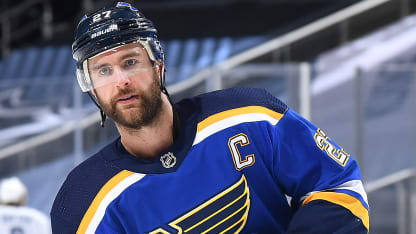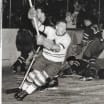Mailbag: Pietrangelo as free agent, Stamkos' standing with Lightning
NHL.com's Dan Rosen answers weekly questions

© Andy Devlin/Getty Images
Alex Pietrangelo has apparently been told by the St. Louis Blues to explore free agency. Is this the right move by general manager Doug Armstrong? Who could fill his void on the blue line? -- @theashcity
Is it the right move? We'll see. That will be judged by how the Blues play without Pietrangelo if he does sign elsewhere. Allowing Pietrangelo to become an unrestricted free agent Oct. 9 is a move the Blues clearly feel they have to make right now, which is the only reason it's happening. It's not like they're unhappy with Pietrangelo. He's terrific. This is strictly a business decision. Pietrangelo is 30 years old. I think any team would question if it wants to marry itself to a 30-year-old defenseman for the next seven or eight seasons.
I wrote in the mailbag before the season started, basically a year ago, that I think the Blues should try to get Pietrangelo signed to a four- or five-year contract. And maybe that would have been possible, but The Athletic reported the current stalemate includes the Blues being unwilling to include a no-movement clause in the contract or provide a signing bonus for the later years, which essentially would serve as buyout protection. Pietrangelo, the St. Louis captain, has every right to ask for those items to be included in the contract; the Blues have every right to say no and walk away. No one knows if it will work out in the Blues' favor, but I think they'll be OK on the right side defensively with Colton Parayko and Justin Faulk as their top two right-shot defensemen. If Pietrangelo signs elsewhere, my guess is Armstrong will look for a third-pair right-shot defenseman in free agency or potentially a trade. I'd think most teams would take Parayko and Faulk as their 1-2 on the right side.
STL@VAN, Gm4: Pietrangelo scores PPG in 2nd period
In your opinion, regarding also last year's Stanley Cup champions, what style of hockey is the best suited for a successful run in the Stanley Cup Playoffs: Grit and grind (perfectly embodied by the Dallas Stars this year) or a spectacular one (the Tampa Bay Lightning, especially the last five seasons)? -- @statslotta
I recently had a conversation with New York Rangers coach David Quinn and asked him what he thinks of the Stanley Cup Playoffs. Quinn said, and I completely agree with him, that regardless of the skill a team has, this is still a big man's league and it's never more evident than in the playoffs. A team with great skill might get by with that and some great goaltending for a round, maybe two. But to go deep you have to be able to play with physicality and have the ability to grind and wear on teams. The Stars do it well with or without the lead. The Lightning have changed to be able to play that style this season. We saw it in Game 2 of the Stanley Cup Final on Monday, when they protected a one-goal lead for the final 14:33 of the third period by keeping the pressure on and not giving the Stars much room through the neutral zone, and holding on for a 3-2 victory. The Lightning weren't overly physical, but they were playing big by staying aggressive, winning puck battles and keeping the Stars away from the net.
The Blues and Boston Bruins, who played in the Cup Final last season, play heavy hockey. The Washington Capitals and Vegas Golden Knights did the same to get to the Stanley Cup Final two seasons ago.
Skill is important; you need it to win. Goaltending is essential; without it you have no chance. But to go deep and wear teams down, especially in a series that goes six or seven games, you have to have size and you have to grind. This isn't about more hits than the opposition, because that typically means you're chasing the puck a lot of the game. This is about playing heavy, with size, and using it to shrink the ice, to stop plays from happening through the neutral zone, to win puck battles, etc. Typically, teams that rely heavily on skill get frustrated when their space shrinks and they run into a hot goalie in the playoffs. That is precisely what happened to the Lightning against the Columbus Blue Jackets last season, when they were swept in the Eastern Conference First Round.
If the Lightning can win the Cup without Steven Stamkos, does he become expendable? He can still put up a bunch of points, but if you're Tampa Bay, with limited salary cap space, do you at least entertain the thought of dealing him? What would he fetch on the market? -- @Rob_Oswald
Stamkos, the Lightning captain and No. 1 center, is not expendable. I'd consider his situation to be similar to the Pittsburgh Penguins winning the Stanley Cup without defenseman Kris Letang in 2017. No one can deny Letang's value to the Penguins, but they were able to win the Stanley Cup without him because of their depth at defenseman, particularly the emergence of Justin Schultz, who scored 13 points (four goals, nine assists) in 21 games that postseason. It didn't make Letang expendable, but it showed that the Penguins could win without one of their most important players because of their depth. The Lightning are doing that this season without Stamkos. Their center depth, particularly the emergence of Anthony Cirelli, has helped them. Cirelli can play first- or second-line center. I think he's a future Selke Trophy winner. Brayden Point is an elite center. His skating sets him apart. Yanni Gourde is the ideal third-line center because of his ability to grind yet play with the skill necessary to be a scoring threat. Cedric Paquette has been a feisty fourth-line center for a number of seasons. My guess is Point or Cirelli would move to the wing if Stamkos were healthy, but he hasn't been, and the Lightning have depth at the position, so they've survived.
But until Game 2 on Monday the Lightning had missed Stamkos' blistering right-shot one-timer on the power play from the left circle. That's a weapon the Lightning can't replace, and the lack of it was hurting their power play until they adjusted in Game 2 and used quick puck movement to open shooting lanes. I really liked seeing Nikita Kucherov find Point, a right-shot like Stamkos, in the middle for a one-timer on the power play to open the scoring. The Lightning were 2-for-4 on the power play in Game 2, but they were 1-for-18 in their previous six games, and are at 19.1 percent in 21 postseason games, well below their 23.1 percent rate during the regular season. Stamkos undoubtedly would have an impact on the power play.
I hope Stamkos can find his way into the Stanley Cup Final because he's put in the miles with the Lightning to get to this point and he deserves the chance to be a part of it.
Do you see the Lightning extending Kevin Shattenkirk? -- @boltsboy91
I would do it provided it's another short-term, fairly low-cost contract. The defenseman played this season on a one-year, $1.75 million contract. Tampa Bay has three defensemen signed for next season: Victor Hedman, Ryan McDonagh and Braydon Coburn. Mikhail Sergachev and Erik Cernak can become restricted free agents after the season, and it's likely the Lightning will sign them. Shattenkirk, Jan Rutta, Zach Bogosian and Luke Schenn each can become an unrestricted free agent. I think the Lightning will try to keep at least two of them while opening space potentially for
Callan Foote
, a 21-year-old defenseman prospect selected with the No. 14 pick in the 2017 NHL Draft. Foote has played the past two seasons with Syracuse of the American Hockey League.
Shattenkirk fits with the Lightning. He helps their power play. He plays well with Hedman. He isn't required to play 20-plus minutes per game, but can if needed; he's better suited for 16-18 minutes. The Lightning might benefit from the fact Shattenkirk also is being paid by the New York Rangers, who bought out the final two seasons of a four-year contract he signed with them July 1, 2017. He seems comfortable with the Lightning and might be willing to accept a contract that works within their NHL salary cap structure because he has guaranteed money coming to him from the Rangers.
DAL@TBL, Gm2: Shattenkirk scores in 1st period
While watching the NHL Awards and being a New York Islanders fan an obvious thought occurs that's worth asking: What has to happen for Adam Pelech to get a Norris Trophy nod? His play clearly impacts the team and that's what a Norris Trophy winner should do. -- @mikeybox
Pelech played 38 of the Islanders' 68 regular-season games, none after Dec. 31, because of an Achilles tendon injury. The Norris Trophy is a regular-season award, so he has to play more than he did in the regular season. Beyond that, he's going to have to impact the Islanders on the offensive end more than he has. The Norris goes to the best defenseman, but the best defensemen also play a significant role in the offense. That's what makes Roman Josi of the Nashville Predators, who won the Norris Trophy this season, such a terrific candidate. He led the Predators with 65 points (16 goals, 49 assists) in 69 games, but most of his offense at even strength (12 goals, 30 assists) was based off his defense. It's the same for Hedman, who was third in voting this season and has been a finalist for the Norris four straight seasons. Top defensemen impact the game in all three zones. Pelech has significant impact for the Islanders in the defensive zone and certainly through the neutral zone, but his NHL best is 21 points (five goals, 16 assists) in 78 games in 2018-19. But he's 26 years old so there's still time for him to elevate his offensive game while continuing to play his stout defensive game.
---
Listen: New episode of NHL @TheRink

















